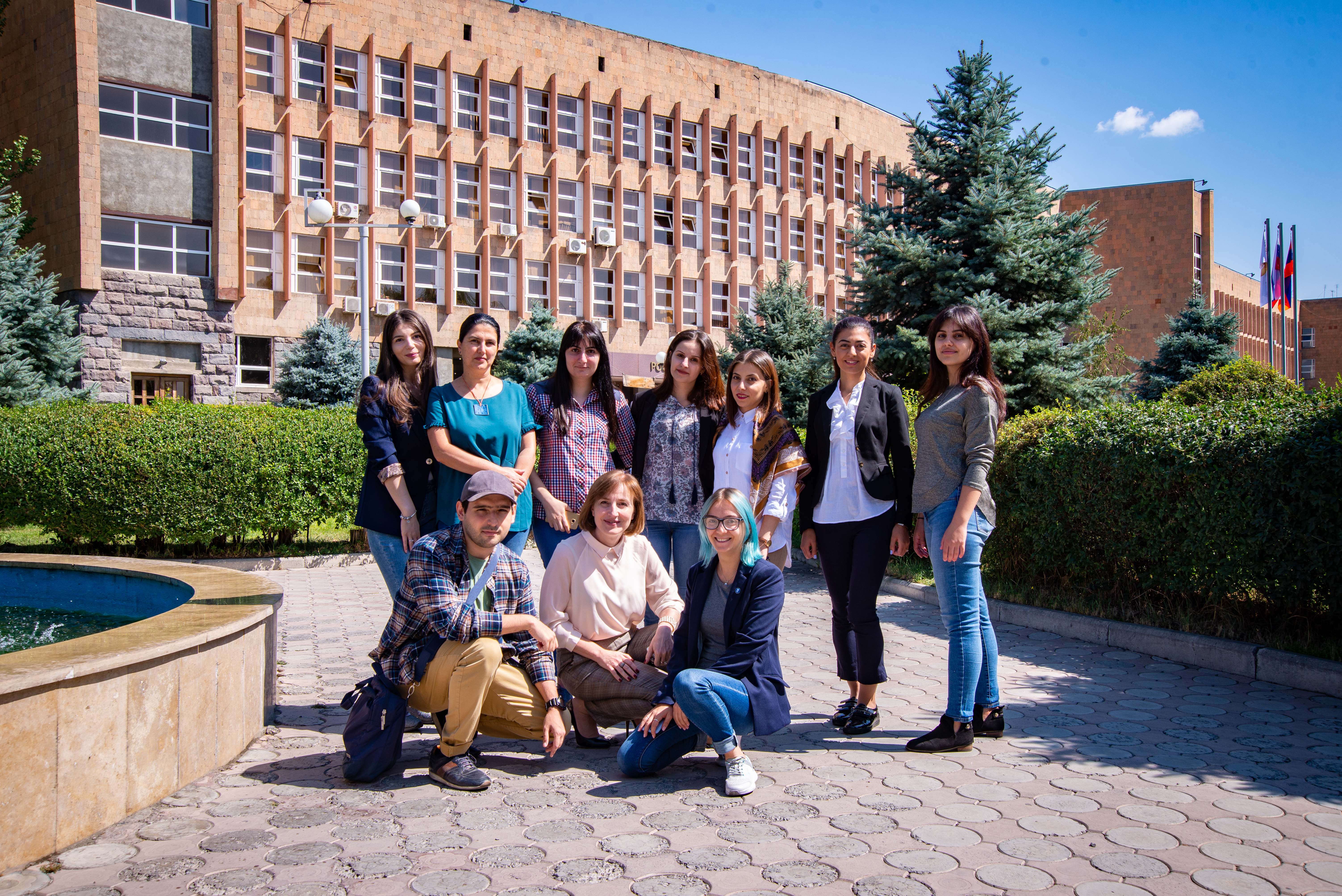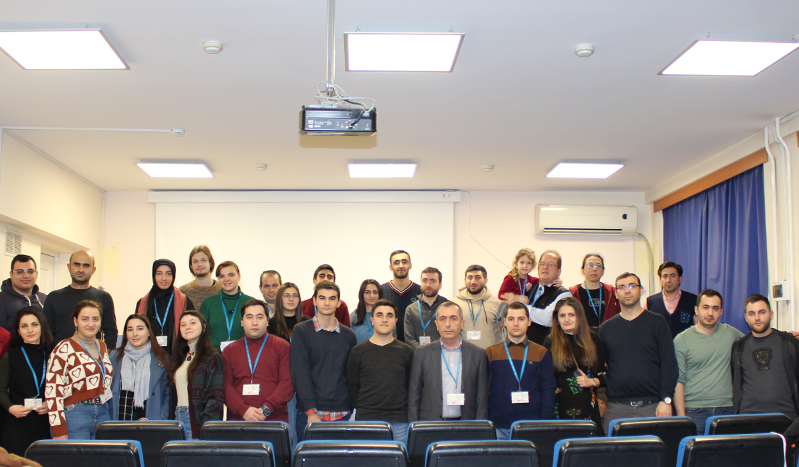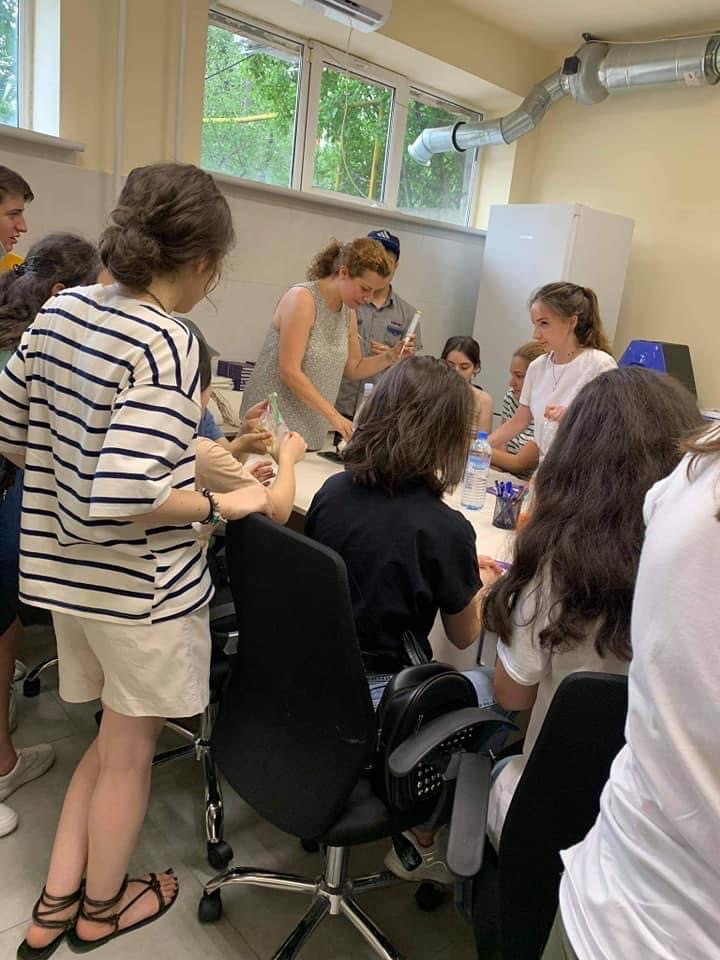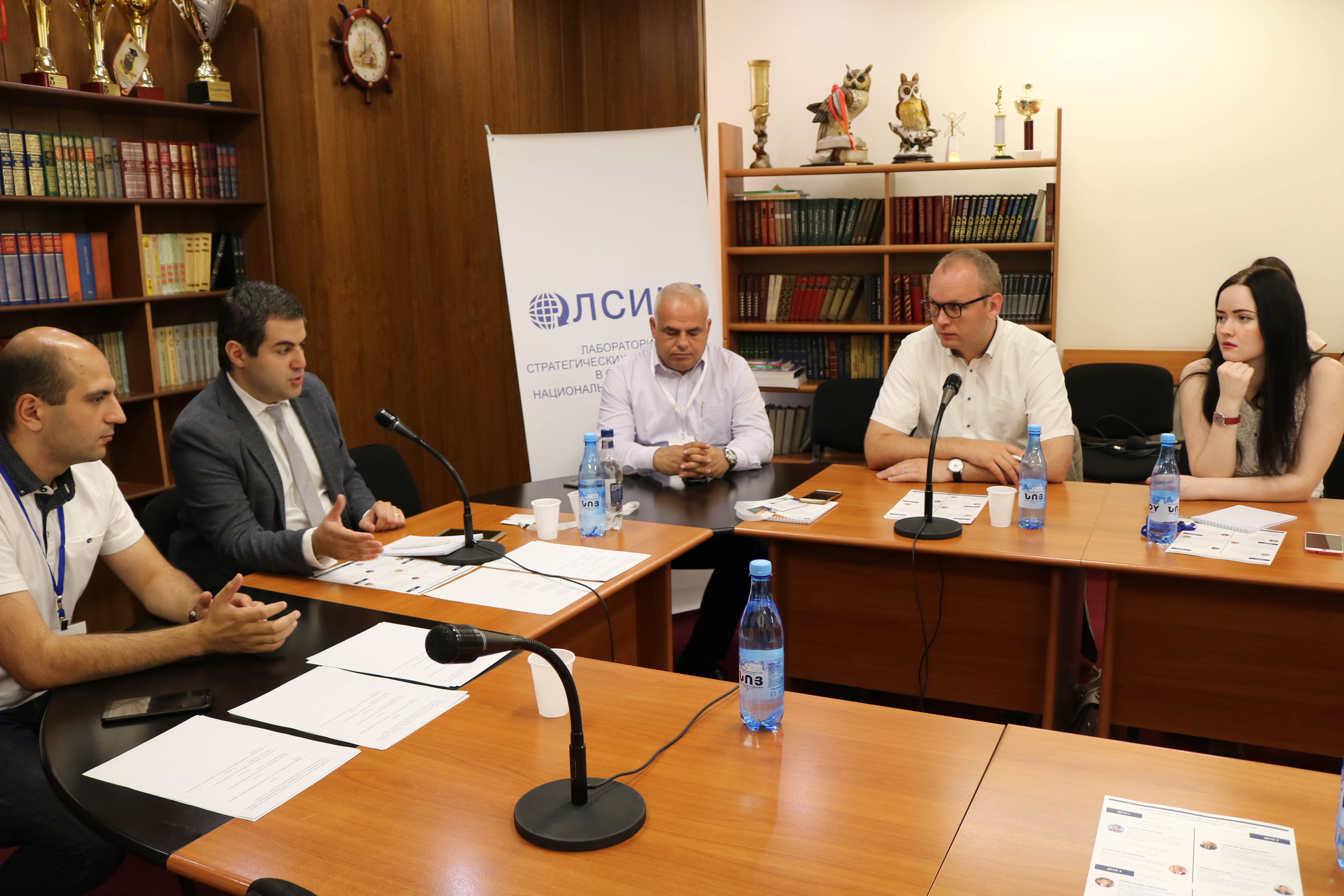Laboratory of "Structural Bioinformatics"
Scientific supervisor: PhD in Biological Sciences, Assoc. Unanyan L.S.
The purpose of the laboratory is research activity in the field of biomodeling and processes taking place in biomedical molecular systems.
The laboratory solves the following research tasks:
- in silico study of physico-chemical and pharmacokinetic parameters of compounds (ADME parameters);
- primary in silico assessment of toxicity of compounds;
- conducting a systematic search to identify and identify the complementarity of binding sites for the ligand-target system. Virtual screening of ligands based on pharmacophore;
- design and modification of bioactive compounds based on pharmacophore using chemoinformatics methods (design of medicinal compounds);
- prediction, determination and validation of molecular targets (proteins and nucleic acids) for the studied classes of compounds (Virtual target screening);
- conformational search for the best and reliable ligand orientation during ligand-target complexation (Molecular docking);
- in silico simulation of ligand-target system interactions in real time taking into account parameters close to real (Molecular dynamics);
- prediction of binding selectivity and the spectrum of action of ligands of various nature based on the analysis of virtual interactions (statistical processing of biological information).
The laboratory 's research interests cover the following areas:
- Neurodegenerative diseases of humans and animals (Alzheimer's disease, Parkinson's);
- Metabolic diseases of humans and animals (pathogenesis of diabetes mellitus and search for antidiabetic agents of various nature;
- In silico development and evaluation of anticonvulsant bioactive compounds;
- Chemoinformatics of antitumor compounds;
- Databases of bioactive compounds.
Partner universities and research centers: Peter the Great St. Petersburg Polytechnic University (SPbPU), Stavropol Medical University.
Laboratory of Analytical Biochemistry and Biotechnology
Scientific supervisor: PhD in Biological Sciences, Assoc. Hovhannisyan A.A.

Directions of the laboratory's research activities:
- Analysis of phytocomponents of various extracts of ethnic plants of the Armenian flora;
- Research of cytotoxic, cytostatic, antioxidant, anti-infective and anti-tumor antidotes, etc. properties of medicinal plants identification of their active components and biochemical mechanisms of action;
- Chemical synthesis and design of nanoparticles with broad therapeutic activities;
- Biogenic synthesis of non-toxic core-shell nanoparticles and their application;
- Study and identification of parameters and type of interactions of biologically active low molecular weight compounds of secondary metabolism of plants and their semi-synthetic derivatives with canonical and non-canonical forms of DNA by methods of molecular dynamics; with transcription regulators, nuclear trans factors;
- The use of in silico methods for the construction of new pharmacophores with low genotoxicity, cytotoxicity and side effects, compared with clinical analogues;
- Obtaining callus cultures of endemic plants of the Armenian flora, in order to study and increase the efficiency of the synthesis of secondary bioactive metabolites;
- Microclonal reproduction of plants.
Educational activities: on the basis of the laboratory, special courses, laboratory, practical, as well as pre-graduate practical classes are held for teaching students of the departments of "Medical Biochemistry and Biotechnology", "Bioengineering and Bioinformatics", "Pharmacy" in specialized disciplines.
Modern material and technical equipment of the laboratory allows students and postgraduates to carry out scientific work for the preparation of term papers, final qualifying, master's and dissertation works.
Partner universities and research centers (collaboration): St. Petersburg Polytechnic University named after Peter the Great, Stavropol State Medical University, Laboratory of Protein Engineering of SIC "Kurchatov Institute".
Laboratory of "Mathematical Modeling of Quantum Systems"
Scientific supervisor: Ph.D., Associate Professor. Hayrapetyan D.B.

The Laboratory of Mathematical Modeling of Quantum Systems (MMQS) conducts simulation, visualization and further analysis of physical processes and phenomena occurring in various quantum systems, and, in particular, in semiconductor quantum nanostructures. The MMQS laboratory is developing a set of programs for determining various physical characteristics of CT. Modules are being created to simulate both electronic properties and optical, statistical characteristics of CT. In addition, a utility module is being developed, designed for such purposes as the construction of diagrams of electronic levels, the construction of various dependencies, the construction of the animation of the evolution of wave functions, etc.
Various packages are being developed and applied in the MMQS laboratory:
- a package for calculating multi-partial states, such as exciton, trionic and biexiton;
- package for calculating impurity states in CT;
- a package with which it is possible to calculate nonlinear characteristics, such as nonlinear absorption, optical rectification, change in the refractive index, generation of second and third harmonics, etc.
It is also worth noting that within the framework of the laboratory's activities, research is being conducted in the field of machine learning, which is widely used in the study of materials and demonstrates superiority both in time efficiency and in the accuracy of forecasts. Machine learning applications for the search and design of materials can be divided into three main classes: the prediction of material properties, the discovery of new materials and various other purposes. In research on the prediction of material properties, regression analysis methods are usually used, which make it possible to predict both macroscopic and microscopic properties. The main idea underlying the application of machine learning in the discovery of new materials is to use a probabilistic model to test various combinations of structures and components and, finally, to select a material with good characteristics from a set of candidates using validation based on density functional theory (DFT). In addition, machine learning is also used for other purposes in materials research, such as process optimization and density function approximation.
Among other things, numerical calculations are carried out in the MMKS laboratory for scientific articles that are published in international peer-reviewed journals.
Partner universities and research centers of the Russian Federation (collaboration): Peter the Great St. Petersburg Polytechnic University (SPbPU), Joint Institute for Nuclear Research.
Center of Excellence "Genome Editing and Third Generation Sequencing"
Scientific supervisor: PhD Biological Sciences, Assoc. Zakharyan R.V.

Genetic engineering and sequencing are rapidly developing areas of biological sciences, opening up new prospects in the study of the hereditary etiology of complex human diseases and the development of effective treatment approaches. These directions combine the data obtained by analyzing the structural features of the human genome with the data of functional, population genomics and pharmacogenetics, as well as the results of genomic editing.
The main goal is to create a fully functioning scientific, educational and research center for:
- Implementation of research programs,
- Providing a base for the completion of theses and dissertations,
- Conducting practices in the field of genetics and genomics,
- Developing and implementing the master's program "Genetic Engineering" in English and Armenian,
- Revising and finalizing curricula in the specialty "Bioengineering and Bioinformatics".
- Scientific directions of the center:
Scientific directions of the center:
- Research of genetic predisposition to multifactorial human diseases;
- Molecular genetic analysis of Sars-CoV-2 variants common in Armenia;
- Creation of a cellular model of diseases based on integrated approaches of genomics and proteomics;
- Evaluation of patients' transcriptome using proteomic approaches;
- Study of the effectiveness of drugs based on the genetic analysis of metabolic enzymes;
- Study of genetic and molecular factors affecting longevity.
Partner universities and research centers (collaboration). Laboratory of Microphysiological Systems of the Faculty of Biology and Biotechnology of the Higher School of Economics, Laboratory of Pharmacogenomics, Institute of Chemical Biology and Fundamental Medicine of the Siberian Branch of the Russian Academy of Sciences (IHBFM SB RAS).
Laboratory of "Strategic Research in the field of national Security"
Scientific supervisor: PhD in Philosophy., assoc. Sarkisyan O.L.

The purpose of the Laboratory of Strategic Research in the Field of National Security is to systematize interdisciplinary scientific research in the field of national security.
Areas of research activity:
- Development and refinement of theoretical and methodological foundations of research;
- Study of the problem of national security in the context of modern integration processes;
- Research of regional security problems.
The scientific activity of the department strives to be closely connected with the research work of students, undergraduates, postgraduates. Special attention is paid to the approval of the topics of term papers, theses and master's theses, with an emphasis on the fact that they contain a problem, contribute to the acquisition of research skills. The subject matter of these works should reflect the priority areas that the department has chosen for its scientific activities. Thus, it is possible to ensure the tradition, and thereby lay the foundations of a scientific school.
The main activity of the laboratory is aimed at preparing analytical materials and organizing events in the field of research of problems of national security and national identity. Another direction is participation in scientific and educational events with the participation of representatives of Armenia, Russia and other countries (CSTO Model Conferences 2015-2018, International Scientific and Educational School "Development of Civic Consciousness: the experience of the states of the Eurasian Space" - 2019).
In 2015-1019, the Laboratory held four international forums "Problems of national security in the context of globalization and integration processes (interdisciplinary aspects)", the materials of which were published in the form of a collection of papers.
A separate format of work concerns the organization of summer schools dedicated to the problems of integration processes in the Eurasian space. In 2020, due to the pandemic, the summer school "Armenia in the context of modern trends in regional integration", as well as all round tables, were held online.
In addition to organizational work, the scientific group of the Laboratory is engaged in the preparation of analytical and scientific publications on topical issues of national security.
Partner universities and research centers (collaboration): The Center for Comparative Socio-Economic and Political Studies of IMEMO RAS, the Center for Post-Soviet Studies of IMEMO RAS, the Institute of International Studies of MGIMO, the Department of Comparative Political Science of the Faculty of Humanities and Social Sciences of RUDN, the Department of Public Policy of Moscow State University, the Institute of International Relations and the Center for Ethnopolitical Studies of PSU, the A. M. Gorchakov Public Diplomacy Support Fund.
The following scientific laboratories operate in the structure of the RAU:
- Laboratory of General Chemistry
- Laboratory of System Programming (opened in RAU jointly with the Institute of System Programming of the Russian Academy of Sciences)
- Laboratory of Criminalistics
- Laboratory for the Study of the Peoples of the Caucasus-Caspian Region
- Laboratory for the development of microwave systems
- Center for Advanced Software Technologies, etc.
The following research groups have been formed at RAU:
Comparison of differential operators, boundary behavior of complex variable functions and factorization of matrix functions
Scientific supervisor: Ph.D. in Physics, Professor A.G. Kazaryan
Investigation of multiparticle and photoluminescent characteristics of semiconductor quantum dots and strokes
Scientific supervisor: Ph.D. in Physics, Professor, Academician of the National Academy of Sciences of the Republic of Armenia E.M. Kazaryan
Two-coordinate photopremes of the mid-infrared range (3-5 microns) based on the p-InSb/n-CdTe heterojunction
Scientific supervisor: Ph.D. in Physics, Professor S.G. Petrosyan
Synthesis of conjugated push-pull systems based on pyrimidine – precursors of organic semiconductor materials
Scientific supervisor: Ph.D. in Chemical Sciences, Professor, corresponding member. NAS RA G.G. Danagulyan
Synthesis of new derivatives of condensed bigeterolytic systems with potential antiviral and antibacterial activity
Scientific supervisor: Ph.D. in Chemical Sciences, Professor A.P. Engoyan
Financial Regulation policy in the Republic of Armenia: assessment and development prospects
Scientific supervisor: Ph.D. in Economics, Professor E.M. Sandoyan
Strategic directions of increasing the competitiveness of the RA higher education system in the context of integration and internationalization (interdisciplinary research)
Scientific supervisor: Ph.D. in Philosophy, Prof. P.S. Avetisyan
Trans-Christian East: on the bridges of the silk highways of antiquity and modernity
Scientific supervisor: Ph.D. in History, Prof. E.G. Margaryan
Development and application of the Goin function apparatus in mathematics and physics
Scientific supervisor: Ph.D. in Physics and Mathematics, Professor, corresponding member. NAS RA A.M. Ishkhanyan
Using diffuse doping technology to create multi-element chips of transparent electronics
Scientific supervisor: Ph.D. in Physics and Mathematics R.K. Hovsepyan
Development of a bioinformatic platform for repurposing drugs based on modeling of biological pathways
Scientific supervisor: Ph.D. in Biological Sciences, Acting Professor A.A. Arakelyan
Epigenetic mechanisms of modulation of gene activity of oxidative stress and inflammation systems in DM2t
Scientific supervisor: PhD in Biological Science G.P. Manukyan
In silico investigation of the formation and regulation of the activity of the macromolecular complex of the pyrinoinflammasome
Scientific supervisor: Ph.D. Biological Sciences, Professor K.B. Nazaryan
Development of low-temperature methods for the formation of nanostructured semiconductor and composite materials
Scientific supervisor: Ph.D. in Technical Sciences, Associate Professor V.A. Gevorgyan
Solving the problems of antibiotic resistance by molecular modeling methods
Scientific supervisor: PhD in Biological Science, Associate Professor S.G. Tiratsuyan
Integral transformations in integral geometry with application in tomography
Scientific supervisor: Ph.D. in Physics and Mathematics, Prof. R.G. Aramyan



